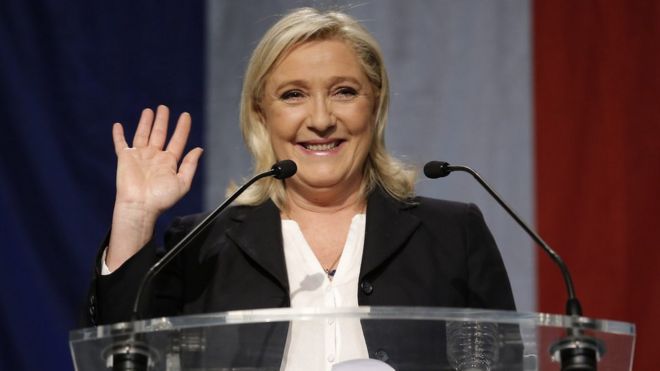- 29 minutes ago
- From the section Europe
France's far-right National Front (FN) appears to have made big gains in the first round of regional elections, estimates show.
They put the FN ahead in at least six of 13 regions in mainland France.The elections are the first electoral test since last month's Paris attacks, in which 130 people were killed.
The centre-right Republicans party led by former President Nicolas Sarkozy appeared to be in second place ahead of the governing Socialist Party.
Has France's National Front changed?
The far-right's charm offensive
Exit polls from Sunday's vote predicted that the FN had won 30.8% of the vote, followed by Mr Sarkozy's Republicans on 27.2% and President Francois Hollande's Socialists with 22.7%.
FN leader Marine Le Pen, who stood in the northern region of Nord-Pas-De-Calais-Picardie, and her niece Marion Marechal-Le Pen, who stood in Provence-Alpes-Cote d'Azur in the south, both looked to have won more than 40% of the vote, polls predicted, breaking previous records for the party.
Addressing supporters, Marine Le Pen said it was a "magnificent result" which proved the FN was "without contest the first party of France".
Sunday's first round will be followed by a run-off on 13 December.
But Mr Sarkozy said there would be no "tactical alliances" in the second round to try to counter the far-right. In previous years, the centre-right opposition and governing Socialist party have worked together to block the FN.
French regions have wide powers over local transport, education and economic development.
In the lead-up to the election, opinion polls suggested that the popularity of the anti-immigration, anti-EU National Front had increased since the attacks on 13 November.
The election has been held under a state of emergency declared after the attacks, which were claimed by Islamic State militants.
The government's response to the Paris attacks has boosted President Hollande's approval ratings - they have soared more than 30 percentage points to 50%.
However, this surge in personal popularity has so far not translated into greater approval for Mr Hollande's Socialist Party, which is trailing with about 22%.
Prime Minister Manuel Valls made an "appeal to patriotism" on Thursday in an effort to rally the Socialist vote.
Assemblies are being elected in the 13 regions of metropolitan France and in four overseas territories.
Suspects at large
On Friday, the Belgian prosecutor's office said police were seeking two new suspects accused of aiding the fugitive suspect from the Paris attacks Salah Abdeslam, who lived in Belgium.The pair are "armed and dangerous" and are thought to have helped Abdeslam travel to Hungary in September.
Who were Paris attackers?
How the Paris attacks unfolded
Investigators say Abdeslam may have driven the suicide bombers at the Stade de France to their target on the night of the Paris attacks.
But Abdeslam's precise role in the attacks remains unclear. There are suggestions he was meant to carry out a suicide attack on the night but decided against it.

No comments:
Post a Comment